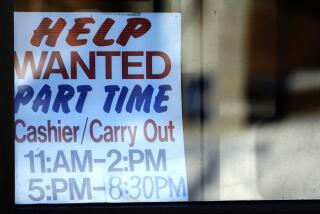Are workers to blame for slow hiring?
- Share via
It’s a common refrain in this economy: American workers are undereducated, unmotivated and probably even on drugs. Companies use the decline of the American worker as a common reason for not filling jobs, saying they would hire, if they could find the right worker.
“I would hire people and train them if they could pass the drug test,” said Keith Mosing, the president of Houston-based Frank’s International, in an interview about a lack of available workers in Louisiana. “But we’re having a lot of difficulty finding people in the U.S.”
But slow hiring isn’t a result of any sort of irreconcilable skills shortage in the U.S. workforce, says Wharton professor Peter Cappelli in his new book, “Why Good People Can’t Get Jobs,” due out Friday.
“There’s a bashing-the-victim feel to all of this,” Cappelli said in an interview. Employers “have assumptions and assertions about how the labor market works that simply aren’t true.”
Problem is, employers are using software to screen applicants, making it nearly impossible for anyone to get through; they’re requiring candidates with a perfect match of experiences, rather than training them on the job; they’ve decimated their HR departments and are keeping any human aspect of hiring out of the picture.
The U.S. ranks seventh among 39 developed countries when measured by the frequency of employers complaining they can’t fill a job, Cappelli says, right behind Romania. But when one Philadelphia-area executive applied anonymously to a job in his own company, he didn’t make it through the screening process.
Employers want to keep looking for the perfect candidate, ignoring the productivity losses their company suffers when they leave a position unfilled. One headhunter was helping a food company find a marketing employee -- but they insisted they find someone with experience in the green olive business, rather than the black olive business, Cappelli said.
“Its not crazy to be picky, but the thing that doesn’t make sense is to say we’re just not going to hire anybody,” he said.
Education isn’t the problem either, Cappelli says. U.S. student performance has improved since the 1970s, and dropout rates fell by half in low-income communities from 1972 to 2009. Surveys show that managers complain more about applicants’ lack of self-management skills than they do about their lack of education.
Cappelli’s own son received a bachelor’s degree in the classics, and, unable to find a job, decided to go to a community college to get a certificate in the supposedly hot healthcare field. He still couldn’t find a job, though, partly because employers only wanted applicants with experience.
But employers aren’t willing to train employees anymore, partly because people switch jobs so much that they don’t want to lose their investments. In 1979, young workers received, on average, 2.5 weeks of training a year. Now, only 21% of employees surveyed say that have received any training over the last five years.
The solution, Cappelli says, is to persuade employers to return to in-house training programs, and for the public and private sectors to work together in developing training programs in which students can get experience with companies. Apprenticeship programs could also help.
But most of all, in an economy where employers are automating more and more positions, it appears that human resources is one profession that can’t be replaced entirely by machines.
RELATED:
Healthcare sector loses steam in California
Companies are afraid to hire, even if business is improving
Major companies to start hiring workers, more CEOs say
More to Read
Inside the business of entertainment
The Wide Shot brings you news, analysis and insights on everything from streaming wars to production — and what it all means for the future.
You may occasionally receive promotional content from the Los Angeles Times.











